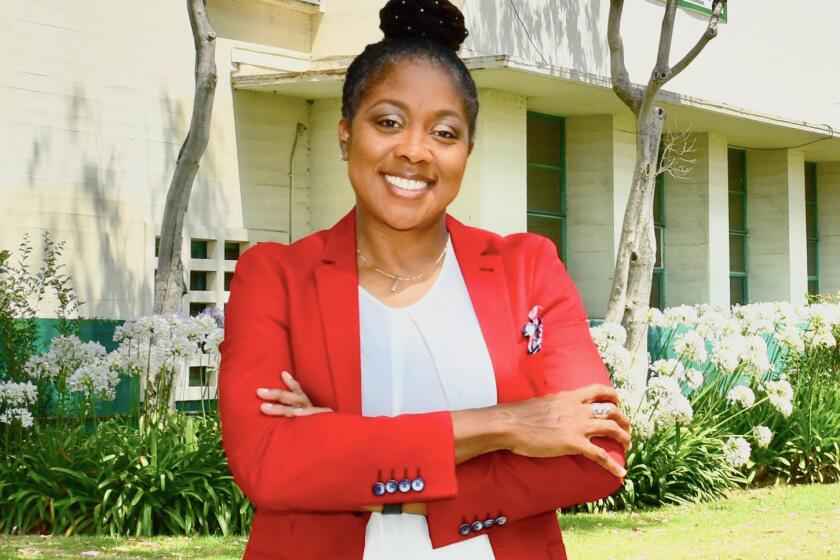Ex-USC admissions official to plead guilty to running scam to admit unqualified Chinese students
In exchange for money, a former admissions official at USC helped graduate students from China gain acceptance to the school by submitting doctored transcripts, fraudulent letters of recommendation and bogus personal statements in their applications, according to a plea agreement filed in federal court.
Hiu Kit David Chong, who worked in USC’s Office of Graduate Admission from 2008 to 2016, agreed to plead guilty to one count of wire fraud in an agreement signed last month and unsealed Wednesday.
Chong’s admissions scheme was separate altogether from the one perpetrated by William “Rick” Singer, a Newport Beach consultant who bribed USC officials, sneaked his star-studded clientele’s children into the school with bogus applications and rigged test scores, and brought, in one USC lawyer’s words, “a media circus” upon the campus south of downtown Los Angeles.
The investigation into Chong’s scam preceded the one into Singer. FBI agents in Los Angeles had been pursuing Chong no later than mid-2017, court records show, about nine months before federal authorities in Boston, investigating a Yale soccer coach suspected of taking bribes, were turned onto Singer.
“Compared to some of the other scandals we’ve seen, this wasn’t really on the scale of what Rick Singer was doing,” said Stanley Friedman, Chong’s attorney. “Nonetheless it was wrong, as [Chong] acknowledged.”
Chong, who returned to Southern California from China in January to resolve his case, is embarrassed, regretful and takes full responsibility for his crimes, Friedman said.
As an assistant director of graduate admissions, Chong’s position allowed him “to learn the ins and outs of the admissions process at USC,” Friedman said. He also operated a side business in Monterey Park, So Cal International Group Inc., which advised students from China on how to apply to graduate programs at American universities, Friedman said.
A USC spokeswoman said the school cooperated with the authorities and believes the fraud was “isolated to one rogue former employee.” Chong concealed his crimes from USC, she said in a statement, and continued committing them for 2½ years after leaving his position.
Between February 2015 and December 2018, Chong purchased college transcripts from a supplier in China, who charged $1,000 to $2,000 per phony academic record, the plea agreement said. Chong submitted the transcripts, along with fake letters of recommendation and personal statements, on behalf of three international students who were admitted to graduate programs at USC.
Identified only by their initials — F.J., Z.L. and S.L. — they each paid Chong between $8,000 and $10,000, according to the plea agreement.
Chong has admitted falling for an FBI ruse that lured him into presenting a fictitious international applicant — “Lin Guoqiang” — to USC with doctored transcripts, in exchange for $8,500 in cash. Remarkably, the fake applicant was admitted to USC, Chong told the undercover agent. The ruse began in July 2017, when an agent emailed Chong with the subject line, “Help to get in university.” The agent was masquerading as “Alex,” whose friend’s son, Guoqiang, was applying to American universities with only a 2.1 grade-point average.
In a recorded phone call, Chong told the agent that while he couldn’t fabricate scores for standardized tests, such as the Graduate Record Examinations and the Test of English as a Foreign Language, he could pay a surrogate to take it for him, the plea agreement said.
The following year, Chong met the agent in Los Angeles. The agent handed Guoqiang’s transcript from a Chinese university, showing a 2.6 GPA, to Chong. Four months later, the plea agreement said, Chong submitted an application on behalf of Guoqiang. His GPA was a 3.47.
In November 2018, Chong told the agent that the fictitious Guoqiang had been admitted to USC. The agent met him in December 2018 and handed over $8,500 in cash, according to the plea agreement. In all, Chong admitted collecting about $40,000 from international students and people he believed to be international students.
More to Read
Sign up for Essential California
The most important California stories and recommendations in your inbox every morning.
You may occasionally receive promotional content from the Los Angeles Times.










